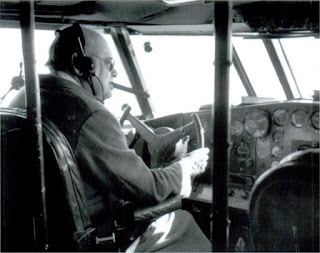Eighty years ago Churchill takes the controls under close supervision
Winston Churchill became the first head of government to fly across the Atlantic when he returned from the Arcadia conference in Washington. The Boeing 314 Clipper had just begun a regular commercial service between the UK and the US when war broke out, but this was still a relatively adventurous way to travel; aircraft accidents occurred frequently. Churchill, who had taken flying lessons long before, was permitted to take the controls although the aircraft's captain did whisper instructions into the co-pilot's ear to apply corrections when he sensed that the prime minister was losing control.
The British ambassador to the Soviet Union, Sir Stafford Cripps, returned to London to resume his career in politics. An extreme left-wing Labour MP, he had been sent to Moscow in 1940 in the hope that his politics would make him an effective representative. It was not an agreeable post and Cripps's sense of his own value there had not been improved by the Beaverbrook mission to discuss aid to the Soviet Union; Cripps had been marginalised in the discussions. He was increasingly out of sympathy with Churchill who finally authorized his return to the UK. With a spurious public reputation as the "man who brought Russia into the war" Cripps had a small but significant fund of political capital that he hoped to parlay into something larger.
The British "Small Scale Raiding Force" conducted Operation Postmaster on the Spanish island of Fernando Po. It was a project of the Special Operations Executive and was firmly opposed by the nearest British army commander, who refused to release local Nigerians required to crew two tugs, and the British embassy in Madrid fearful of the impact on Spanish neutrality. The military justification was minimal; the target was an Italian merchant ship the Duchessa d'Aosta which was equipped with a powerful radio, supposedly usable to direct U boats. The ship was successfully cut out and sailed into Lagos, but German propaganda made much of the act of "piracy" that it attributed directly to the Royal Navy.
At a short meeting in the Berlin suburb of Wannsee Reinhard Heydrich of the SS briefed colleagues and representatives of other German agencies on the plans for the murder of all Jews anywhere in Europe, the final solution in the Nazis' euphemism. He presented a list showing the number of Jews by country: eleven million divided between countries already in German power and those not, namely German allies, neutrals and Britain The decision to commit the crime had already been taken and extermination camps at Belzec and Chelmno had begun to operate. Heydrich explained that the SS would carry out the plan, taking precedence over any other authority. Against Heydrich's expectations there was no dissent from anyone; the only questions were on points of detail. Genocide had become the raison d'etre of the German state.



Comments
Post a Comment